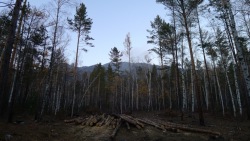Corruption
There is an illegal logging site in the forest near Arshan. Everybody in the village knows who are responsible for cutting down the trees, but since appropriate parties are paid off, nothing is done about it. What is even worse, only the most valuable part of the tree is collected, with the rest left rotting in the forest. Locals do not dare to pick that wood, because as soon as you touch you will be charged with illegal logging for the whole business. Sigh. Another example, when tax agency inspect grocery stores, they tend to grab things like vodka, fish, bread, sausage and other ingredients making a perfect picnic party to do a “lab analysis”. Business as usual.
Money
It seems like Russia is on the mission to reach the price level of Europe, while quality of service not making any progress. The smallest practical money unit is around 1-5 rubles, but the coinage goes all the way down to 1 kopeika (1/100th of a ruble). Most prices are not rounded making money transactions a complicated business and there is a constant shortage of chanfe. When you purchase something, they tend to ask you for change instead. Sometimes this results in a deadlock, when both parties do not have any change, the cashier is not prepared to make a small discount. You also see coins lying everywhere, especially in tourist spots (even as far as in Mongolia). Shows how useful all these coins really are.
Trash management
One thing many Russians are not able to do is to take care of their trash. Everywhere you look you see heaps of garbage. When you travel by train, the entire area along the railway is covered with litter people throw out windows. Trash management in villages and small towns is not any better. People just throw out trash outside their property or sometimes even form a landfill in their own backyard or nearby road. National parks have not escaped this fate. Here again trash is everywhere: empty bottles, tin cans and even batteries. What is particularly sad that Russians take pride in their rich nature and holy land, but are unable to keep it clean at the same time. There are signs everywhere reminding to take care of your trash (sponsored by some company), but no trash cans. Go figure. It is almost shame that Russia has such a vast area, making it possible such a care-free policy. If Russia had one tenth of the area, maybe this ill practice would change. So sad.


